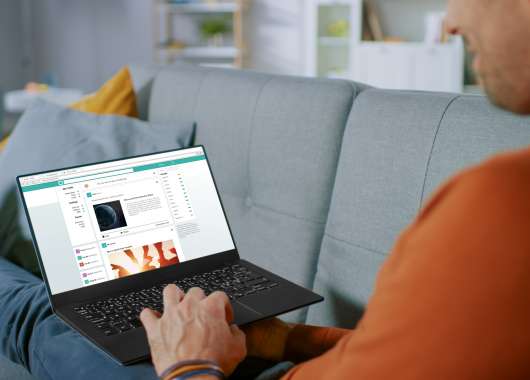Staying logged into Facebook might seem convenient, but it opens the door to sophisticated tracking, dangerous exploits and even attacks through infected SVG files. Here’s how to protect yourself from Meta’s data collection and emerging cyberthreats.
Key takeaways
- Staying logged into Facebook allows Meta to track your activity across the entire web, not just on their platforms. For many people this may be feel like an invasion of privacy
- New malicious exploits like JSFuck can hijack your logged-in Facebook session to perform actions without your consent
- Adult websites are using weaponized SVG image files to secretly “like” Facebook posts on your behalf, exposing your private activity to friends, family and marketers
- Logging out of Facebook significantly reduces your exposure to both tracking and session-based attacks
How Meta tracks you beyond Facebook
When you remain logged into Facebook, you’re essentially giving Meta permission to follow you around the internet. The company doesn’t just collect data about your activity on Facebook and Instagram – it actively harvests information from millions of other apps, websites, and services that use Meta’s tracking technologies.
This extensive surveillance network includes websites with Facebook “Like” and “Share” buttons, Facebook Login integration and invisible tracking pixels. Even if you never click these buttons, Facebook is still collecting data about your browsing habits, the articles you read, videos you watch, and products you view. This ‘digital footprint’ is used to build a detailed marketing profile based on your interests – including adult content viewing habits.
Meta’s tracking toolkit collects information like:
- Your device information (phone brand, operating system, installed apps)
- Technical data (IP address, internet speed, time zone, network connections)
- Location data from GPS and network signals
- Behavioral patterns (how long you spend on pages, scroll patterns, click behavior)
The emerging threat of SVG-based exploits
A concerning new attack vector has emerged that specifically targets users who stay logged into Facebook. Cybercriminals are embedding malicious JavaScript code inside seemingly harmless image files called SVGs (Scalable Vector Graphics).
How the JSFuck exploit works
Security researchers have discovered that adult websites are distributing malicious SVG files that contain heavily obfuscated JavaScript code using a technique called “JSFuck”. ‘Obfuscation’ is a programming technique designed to make code impossible to read by other developers – or anti-malware tools.
If you click on these weaponized image files, the hidden code springs into action:
- The SVG file opens in your default browser (typically Microsoft Edge on Windows)
- In the background, obfuscated JavaScript code executes automatically
- The script downloads additional malicious payloads from remote servers
- If you’re logged into Facebook, the malware silently clicks “Like” on targeted posts without your knowledge or consent
Importantly, this attack only works if you have an active Facebook session. However, this has led to many users become unknowing victims who keep Facebook open for convenience.
Although JSFuck targets adult website users, the same techniques can be used to exploit everyone who stays permanently logged into their Facebook account.
How to protect yourself against weaponized SVGs (and Meta)
Step 1: Log out regularly
The most effective defense against session-based exploits is simple: log out of Facebook when you’re not actively using it. This breaks the connection that malicious scripts rely on to hijack your account.
Step 2: Use Facebook’s privacy tools
Facebook provides built-in tools to limit tracking, though they require manual configuration:
- Access “Settings & Privacy” -> “Privacy Checkup” to review your data sharing preferences
- Navigate to “Your Facebook Information” -> “Off-Facebook Activity” to see what external data Facebook has collected about you
- Clear your activity history and turn off future off-Facebook activity tracking
Step 3: Install anti-malware
Implement additional safeguards in your web browser:
- Install a tool like Panda Dome which can identify and block malware from being installed
- Consider switching to privacy-focused browsers like Brave or Firefox
Step 4: Be cautious with files
- Never open SVG files from untrusted sources, especially from adult websites or suspicious emails
- Be skeptical of image files that prompt you to “preview in browser”
- Keep your browser and security software updated to detect the latest threats
The cost of convenience
While staying logged into Facebook offers convenience, the privacy and security trade-offs are substantial. Meta has been caught using methods that privacy experts describe as similar to those employed by digital criminals. The company secretly compiled logs of users’ web browsing activities on Android devices for months without user or Google’s knowledge.
Meta’s data collection extends far beyond what you realize. The company tracks not just your social media activity, but your real-world location, device usage patterns, app installations, and even tries to match your online behavior with offline purchases.
Taking control of your digital footprint
The choice is ultimately yours: accept the convenience of persistent social media sessions along with extensive tracking and security risks or take proactive steps to protect your privacy and security.
Logging out of Facebook regularly is one of the simplest yet most effective ways to limit both Meta’s surveillance and your exposure to emerging cyberthreats like the JSFuck exploit. Combined with proper browser security settings and cautious file handling, this basic practice can significantly improve your online privacy and security posture.
Your personal data is valuable – to you and to the companies that profit from it. Taking control starts with something as simple as clicking “Log Out” when you’re done browsing social media.






